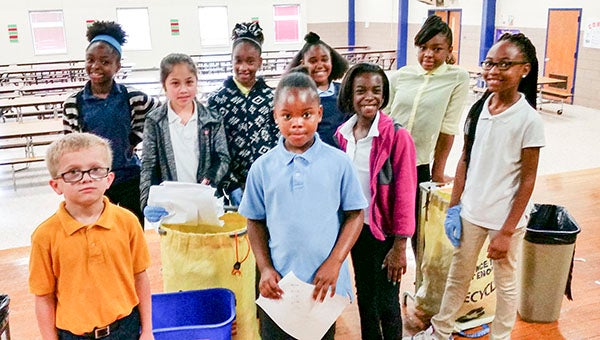Franklin schools’ recycling program still going strong 20 years later
Published 11:06 am Monday, June 6, 2016

Second graders from Stephanie Neupert’s class at S.P. Morton Elementary School participate in recycling program that has been going on for nearly 20 years. This program is something that students at all three Franklin schools are a part of. Pictured from left are Anaiyla Cherry, Julianna Perea, Jakayla Brown, Akayla Bynum-English, Nadia Smith-Milian, Ladesha Warren, Timothy Wetterstron, Simiyah Norfleet and Niyah Wilson. — SUBMITTED
FRANKLIN
Sometime between 1996 and 1998, a fourth-grader at S.P. Morton Elementary School started up a recycling program that is still going. The program has been altered in a few ways over the years, but, all three schools still stick to the core values the student had for the program.
Ashley Reyher realized the importance of recycling at a very young age and decided that the schools needed to be participating in that practice. Although she was supervised by the gifted program teacher Bev Rabil, Reyher created the project all by herself.
She came up with a plan, drafted the guidelines, had meetings to get the funding and figured out every other detail the project needed to come to fruition. The program started at S.P. Morton, but eventually spread to all schools in the system.
Reyher decided what would be easiest and best for the schools to recycle would be paper.
“The purpose of recycling paper at S.P. Morton is to establish a recycling program at the school level, in order to educate the student body about recycling and to help the environment,” the plan stated.
She set up a meeting with school officials, and after they approved her plan she had a meeting with workers at Union Camp. She also found a company that would come get the paper from the schools and take it to Union Camp.
“Hercules Inc. has agreed to provide transportation monthly from S.P. Morton to Union camp Fiber Recycling Company,” the plan continued. “They will pick up the paper on the first Friday of every month depending upon the school calendar. These dates will be established with Hercules each fall. The paper will be taken from the recycling center to be loaded onto the truck behind the kitchen.”
Union Camp agreed to Reyher’s idea and all she had left to do was come up with a plan each classroom would follow when it came to recycling paper.
She decided that this task is something that could be handled by the Student Council Association at the school.
“The Student Council Association representatives will be trained at the beginning of each school year on how to fulfill their recycling responsibilities,” the plan said. “With the SCA’s help and support it will be the responsibility of each homeroom representative and alternative to maintain their classroom’s and partner’s bin.”
Each classroom was given a bin provided by Hercules Inc. that they put at the front of the room to drop their paper in to to be recycled.
Guidelines for what kind of paper was allowed in the bins were also put in place.
The paper had to either be notebook paper, white ditto paper or colored ditto paper. Paper that was not allowed in the bins included newspaper/magazines, paper with crayon markings, cafeteria wrappers/food wrappers, paper towels/tissues and paper with a gloss or lacquer finish.
Included in the plan, as well as the contract that was signed by Union Camp, was that the schools would receive money for their recyclables.
“Union Camp will pay $1.50 per every 50 pound bag of paper. This money will go straight to the SCA’s treasury. This money may be spent on anything that is beneficial to the students’ education and/or any worthwhile SCA project,” the plan said.
Although a few aspects of the project have changed, the overall process has stayed the same.
Liz Burgess, the teacher who currently oversees recycling at the schools, said that one of the changes is that Union Camp no longer takes the paper from the schools, instead, Butler Paper on Armory Drive does.
She also said Hercules Inc. has changed the name of its company since the initial start of the project to Solenis.
“When I started here, Hercules folks would pick up the paper once a month during the school year and take it to the recycling warehouse at the paper mill,” Chris Moniz, a former employee of Solenis who was in charge of picking the paper up from the schools for several years said. “IP would pay the schools for the paper. When International Paper closed, we continued the pick up and took the paper to Butler Paper here in Franklin who provides payment to the schools.”
Burgess added that aside from making money for SCA, the recycling program teaches the students responsibility, which is why she hopes it will continue to be a project at the schools for years to come.
“I love this project,” said Burgess, the teacher who oversees recycling at the schools now. “It’s a great responsibility for the kids and puts it in the hands of all the students.”





